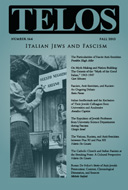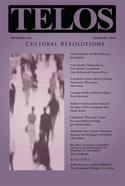By Telos Press · Monday, April 14, 2014 The Telos-Paul Piccone Institute has several important events in the works for 2014, including conferences and symposia in Melbourne, Australia, Beijing, China, L’Aquila, Italy, and Irvine, California. At the recent Telos Conference in New York City, David Pan, Executive Director of the Institute, outlined the themes for this year’s conference.
Continue reading →
By Telos Press · Monday, October 21, 2013  On Saturday, October 26, the Telos-Paul Piccone Institute and the Centro Primo Levi will host a panel discussion on Telos 164: Italian Jews and Fascism. The discussion will be held at Casa Italiana Zerilli Marimò, 24 West 12th Street, in New York City, from 1 pm to 4pm. Following the discussion, there will be a cocktail reception that will include Maria Piccone’s delicious “amaretti” cookies, in honor of Telos‘s 45th Anniversary. We hope to see you there! On Saturday, October 26, the Telos-Paul Piccone Institute and the Centro Primo Levi will host a panel discussion on Telos 164: Italian Jews and Fascism. The discussion will be held at Casa Italiana Zerilli Marimò, 24 West 12th Street, in New York City, from 1 pm to 4pm. Following the discussion, there will be a cocktail reception that will include Maria Piccone’s delicious “amaretti” cookies, in honor of Telos‘s 45th Anniversary. We hope to see you there!
Continue reading →
By Telos Press · Monday, October 14, 2013  On Saturday, October 26, the Telos-Paul Piccone Institute and the Centro Primo Levi will host a panel discussion on Telos 164: Italian Jews and Fascism. The discussion will be held at Casa Italiana Zerilli Marimò, 24 West 12th Street, in New York City, from 1 pm to 4pm. We hope to see you there On Saturday, October 26, the Telos-Paul Piccone Institute and the Centro Primo Levi will host a panel discussion on Telos 164: Italian Jews and Fascism. The discussion will be held at Casa Italiana Zerilli Marimò, 24 West 12th Street, in New York City, from 1 pm to 4pm. We hope to see you there
Continue reading →
By Franklin Hugh Adler · Monday, September 23, 2013 Telos 164 (Summer 2013) is now available for purchase in our store.
 When we examine European anti-Semitism during the 1930s, and especially the Shoah, the case of Germany looms so large that the Nazi regime immediately appears as the paradigmatic form of fascism and the manifold policies directed against European Jewry during the 1930s little more than German racial policy writ large. Without in any way trivializing or, worse, relativizing in an ethical sense the German case, one might nevertheless suggest that it occupies too much conceptual space and occludes a more precise comparative understanding of other European cases where anti-Semitic policies had been autonomously generated, relatively independent of direct Nazi pressure. In this sense, decentering the German case might be a necessary first step toward a less encumbered perspective on what happened elsewhere. When we examine European anti-Semitism during the 1930s, and especially the Shoah, the case of Germany looms so large that the Nazi regime immediately appears as the paradigmatic form of fascism and the manifold policies directed against European Jewry during the 1930s little more than German racial policy writ large. Without in any way trivializing or, worse, relativizing in an ethical sense the German case, one might nevertheless suggest that it occupies too much conceptual space and occludes a more precise comparative understanding of other European cases where anti-Semitic policies had been autonomously generated, relatively independent of direct Nazi pressure. In this sense, decentering the German case might be a necessary first step toward a less encumbered perspective on what happened elsewhere.
Continue reading →
By Danilo Breschi · Thursday, July 25, 2013 Danilo Breschi’s “From Politics to Lifestyle and/or Anti-Politics: Political Culture and the Sense for the State in Post-Communist Italy” appears in Telos 163 (Summer 2013). Read the full version online at the Telos Online website, or purchase a print copy of the issue in our store.
 In Italy, the transition from communism to post-communism, from the PCI to today’s Democratic Party, has been determined and strongly influenced not only by the collapse of ideologies and by the changes in the international political scene after 1989, but also by the profound changes that have invested the customs, lifestyles, and collective mentality from the end of the 1960s and, ever more rapidly, from the 1970s. Mass individualism and consumer society are the factors that more than others have undermined the myth of the anthropological “diversity” and the claim to moral superiority cultivated for decades by the Italian communists. Moreover, they help explain the passage of many of them from the utopia revolutionary and the dream of a “new world” to the liberal-bourgeois radicalism that seems to characterize today’s Italian left. Is there anything left of the communist tradition in today’s Italian political and cultural scenario? There is probably one attitude shared by many Communist militants but that belongs to the entire Italian political tradition, i.e., the deeply rooted aversion to public institutions and a poor sense of the state as embodying the rule of law. The greatest and most negative legacy of the long hegemony, on the left, of a communist party narrowly loyal to the Soviet Union was and still is the lack of legitimacy of the state and its institutions. The Soviet experiment having failed, there remains a populist cultural capital that has passed on to the Lega Nord in the 1990s and that has recently migrated to the Five Stars Movement of Beppe Grillo. In Italy, the transition from communism to post-communism, from the PCI to today’s Democratic Party, has been determined and strongly influenced not only by the collapse of ideologies and by the changes in the international political scene after 1989, but also by the profound changes that have invested the customs, lifestyles, and collective mentality from the end of the 1960s and, ever more rapidly, from the 1970s. Mass individualism and consumer society are the factors that more than others have undermined the myth of the anthropological “diversity” and the claim to moral superiority cultivated for decades by the Italian communists. Moreover, they help explain the passage of many of them from the utopia revolutionary and the dream of a “new world” to the liberal-bourgeois radicalism that seems to characterize today’s Italian left. Is there anything left of the communist tradition in today’s Italian political and cultural scenario? There is probably one attitude shared by many Communist militants but that belongs to the entire Italian political tradition, i.e., the deeply rooted aversion to public institutions and a poor sense of the state as embodying the rule of law. The greatest and most negative legacy of the long hegemony, on the left, of a communist party narrowly loyal to the Soviet Union was and still is the lack of legitimacy of the state and its institutions. The Soviet experiment having failed, there remains a populist cultural capital that has passed on to the Lega Nord in the 1990s and that has recently migrated to the Five Stars Movement of Beppe Grillo.
Continue reading →
|
|
 On Saturday, October 26, the Telos-Paul Piccone Institute and the
On Saturday, October 26, the Telos-Paul Piccone Institute and the  In Italy, the transition from communism to post-communism, from the PCI to today’s Democratic Party, has been determined and strongly influenced not only by the collapse of ideologies and by the changes in the international political scene after 1989, but also by the profound changes that have invested the customs, lifestyles, and collective mentality from the end of the 1960s and, ever more rapidly, from the 1970s. Mass individualism and consumer society are the factors that more than others have undermined the myth of the anthropological “diversity” and the claim to moral superiority cultivated for decades by the Italian communists. Moreover, they help explain the passage of many of them from the utopia revolutionary and the dream of a “new world” to the liberal-bourgeois radicalism that seems to characterize today’s Italian left. Is there anything left of the communist tradition in today’s Italian political and cultural scenario? There is probably one attitude shared by many Communist militants but that belongs to the entire Italian political tradition, i.e., the deeply rooted aversion to public institutions and a poor sense of the state as embodying the rule of law. The greatest and most negative legacy of the long hegemony, on the left, of a communist party narrowly loyal to the Soviet Union was and still is the lack of legitimacy of the state and its institutions. The Soviet experiment having failed, there remains a populist cultural capital that has passed on to the Lega Nord in the 1990s and that has recently migrated to the Five Stars Movement of Beppe Grillo.
In Italy, the transition from communism to post-communism, from the PCI to today’s Democratic Party, has been determined and strongly influenced not only by the collapse of ideologies and by the changes in the international political scene after 1989, but also by the profound changes that have invested the customs, lifestyles, and collective mentality from the end of the 1960s and, ever more rapidly, from the 1970s. Mass individualism and consumer society are the factors that more than others have undermined the myth of the anthropological “diversity” and the claim to moral superiority cultivated for decades by the Italian communists. Moreover, they help explain the passage of many of them from the utopia revolutionary and the dream of a “new world” to the liberal-bourgeois radicalism that seems to characterize today’s Italian left. Is there anything left of the communist tradition in today’s Italian political and cultural scenario? There is probably one attitude shared by many Communist militants but that belongs to the entire Italian political tradition, i.e., the deeply rooted aversion to public institutions and a poor sense of the state as embodying the rule of law. The greatest and most negative legacy of the long hegemony, on the left, of a communist party narrowly loyal to the Soviet Union was and still is the lack of legitimacy of the state and its institutions. The Soviet experiment having failed, there remains a populist cultural capital that has passed on to the Lega Nord in the 1990s and that has recently migrated to the Five Stars Movement of Beppe Grillo. 

